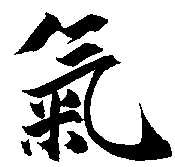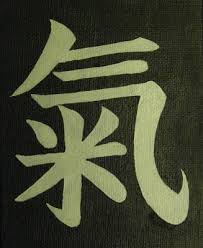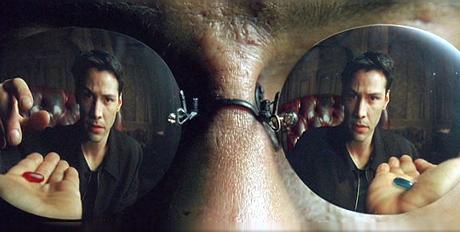
Personally I like the slightly older version. This one is still in use in China, but pronounced "Chi". Most Aiki martial artists in Japan also seem to favor this one.

This is a modern simplified Chinese version - with cool stroke order animation!

Construction of the Character
The image behind this pictogram is cooking rice with vapors coming off of it.
I made a video to explain
So lets try to get a clearer understanding of the meaning of this word. I think most people have a poor concept of it. They see it as magic, or the force.
The dictionary definition is Gas, Spirit
The original meaning was Gas
Let's look at some Japanese words using Ki in the "gas" context
Kitai - gas, vapor
Kika - evaporation
kiryu - air current
kanki - ventialtion
It also has many atmosphere feelings to the word
taiki - the atmosphere
fun'iki - mood
keiki - things, times, business conditions
Ki can also mean Breath
kikan - trachea, windpipe
kisoku - breathing
ikik ni - in one breath, at a breath
Ki - vital energy, spirit, breath of life, vitality
byoki - sickness
genki - vigor health
seiki, energy, essence
yuki - valor, courage
Ki as energy or force
denki - electricity
jiki - magneticism
Ki as natural phenomena

kisho - weather conditions
kiko - climate
tenki - weather
Ki as spirit, mind, conciousness

shoki - sanity
kyoki - insanity
kigamae - readiness of mind
kizuku - notice, become aware of
kimochi - feeling
kimae - generosity
honki - seriousness
When used as a suffix - can indicate temperment, temper, disposition, pne's nature, character.
tsuyoki no - strong, firm
tanki na - short tempered
makenki - unyielding
Ki as "mind to do something, intention, will"
kiraku na - easy going
kaiki - bullish
hakike - nausea
Ki also has meanings like - care. attention, precaution, sign, indication, symptom, trance air, flavor, a dash of

When independent it Ki feels more like
Spirit, mind conciousness, one's feelings, mood, frame of mind, temperment, temper, disposition, one's nature, intention, will, attention and precaution
In a special reading it can also mean honor and self respect.
So I hope this has helped to confuse you on the complex meaning of ki. Really by looking at the words the Japanese make out of it, I think the meaning becomes somewhat clearer, and useful for our practice as Budoka.







On a business trip once, my hotel room had vaguely asian decor. There were a couple of "pictures" on the wall that featured some kanji. One of them was "ki", but it was hung upside down.
ReplyDeletelove the expolding of "ki" -- recently read a bunch of nev sagiba's blogs --he likes to equate ki with action plus intent -- good stuff
ReplyDeleteI have a theory pertaining to the idea of ki as being a sort of life force energy cultivated through specific movements as in Tai Chi or Chi Gung. Just as an electrical charge is generated when a conductor moves through the lines of a magnetic field, perhaps the iron in our blood picks up a charge by performing Chi generating movements by cutting through the Earth's magnetic field lines. Just a theory.
ReplyDeletei find that there is yin chi and yang chi and the balance between them that is mistaken for chi, but many fail to take in account that the certain "chi" you experience at the moument is made up of yin and yang and in diffrent quanitys they produce diffrent effects.i also find the chi to behave , if you will, diffrently when cultivted in seperate of combined chakra meditation, some for example produce heat being your sacral chakra but when coupled with the root chakra it feels much more like electricity.
ReplyDeletei am no master by any means ive only began my journey, ive found these realizations within myself as feelings manifested by what can only be explained as chi.
good luck to you all my friends.
.Anon
Great post.
ReplyDeleteI would only add that the concept of Ki was imported from China, as was much of Japanese language and culture.
Chinese character for Qi = 氣
This article by Dr. Yang, Jwing-Ming discusses the pictogram's origins with a bit more detail.
http://ymaa.com/articles/basic-concepts-qi-and-qigong
Your video is great, thank you.
I believe that ki is the concept of the vital energy considered principally in human beings arising from the physical and psychical (human psyche ans spirit)aspects working together for the wellbeing. It is not only the breathing and the air incorporated by the breathing, it is also the blood circulation, lungs and hearth work, nervous system, any body system, and mental, psychical ans spiritual well being. If we do not breath well, we will have no good ki, if we are weak in our hearth and lungs, we will have no good ki. If we are damaged in our nervous system we will not have good ki, if we have a damage to a body system we will have no good ki, and very important, if we are not good mentally, or psychically or spiritually, we can make insufficient even our good health and provoke the lowering of our defenses and the deterioration of our physical aspects.
ReplyDeleteThe more horrible spiritual foe of a human being is the sense of its disconnection and enmity of God because of their sins. So if a human being reach peace with the personal omnipotent God, peace of spirit and mind will be guaranteed.
Romans 5:1-5
@ARY The inclusion of the nervous system is quite accurate. Qi is more encompassing than just this ubiquitous energy, blood flow or breath.
ReplyDeleteWhile I am also a Christian that believes in a personal relationship with Jesus Christ, I would say your last sentence is proven false. There are many believers that are at peace with God but they suffer with depression or physical problems as well.
The point here is one that is often mistaken. Qi is NOT spiritual at all. The energy manifested from it is a property of nature and is not dependent on your spiritual walk. It's like breath and bloodflow. We all have it whether we recognize it or not, it's there.
I realize that this is an old blog, but I'd like to say a few things. I am by no means an expert in Chinese or Japanese, but I find it unlikely that the original meaning of chi can be translated by the modern English word "gas" with all the modern scientific shades of meaning that gas entails. Maybe energy, but even then there are modern connotations to deal with. I absolutely believe, contrary to Mr. Holloway, that chi has spiritual associations, it's main associations in fact. The Chinese equated "air" with spirit, just as the Romans did - spirit, respiration, etc. They might have had the beginnings of what we today as a society term science (thinking such a mindset superior as we do so) but their entire world was infused with spirit. Spirit was the animating force behind everything, and the reason why any "thing" could even exist at all. Later scientific words being derived from ki does not mean they always thought of ki in scientific terms, or even that they were trying to explain ki as some bio energy devoid of spirit. We might think today that such a worldview is Pre-logical, but thinking so doesn't mean they still didn't have that worldview. Does it have a physical manifestation? Of course it does, just as humans and all other things in the universe, but for everything that is seen, nine things remain unseen. The physical "electromagnetic" manifestation is not all that ki is, nor is it the majority of what ki is, human inability to emotionally and psychologically deal with ambiguity not withstanding.
ReplyDeleteChristopher Crittenden
Student of Sensei Dallas Lloyd
Coastal Winds Martial Arts, Long Beach MS